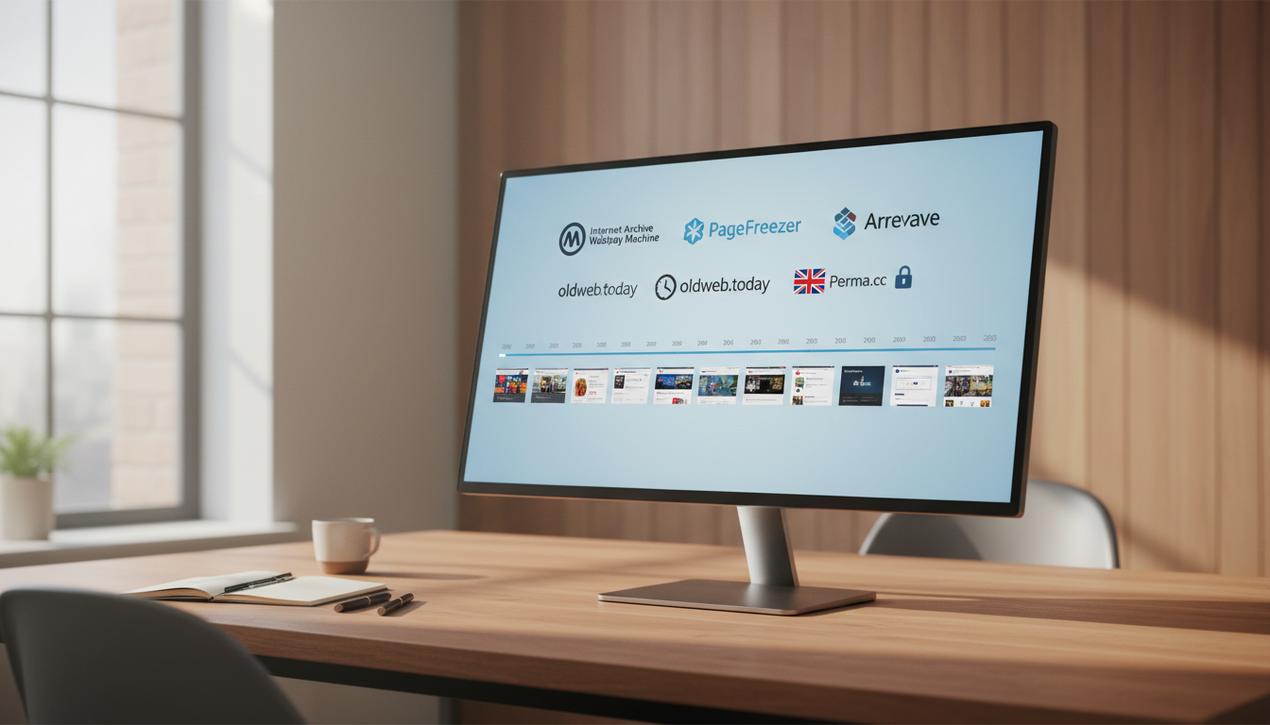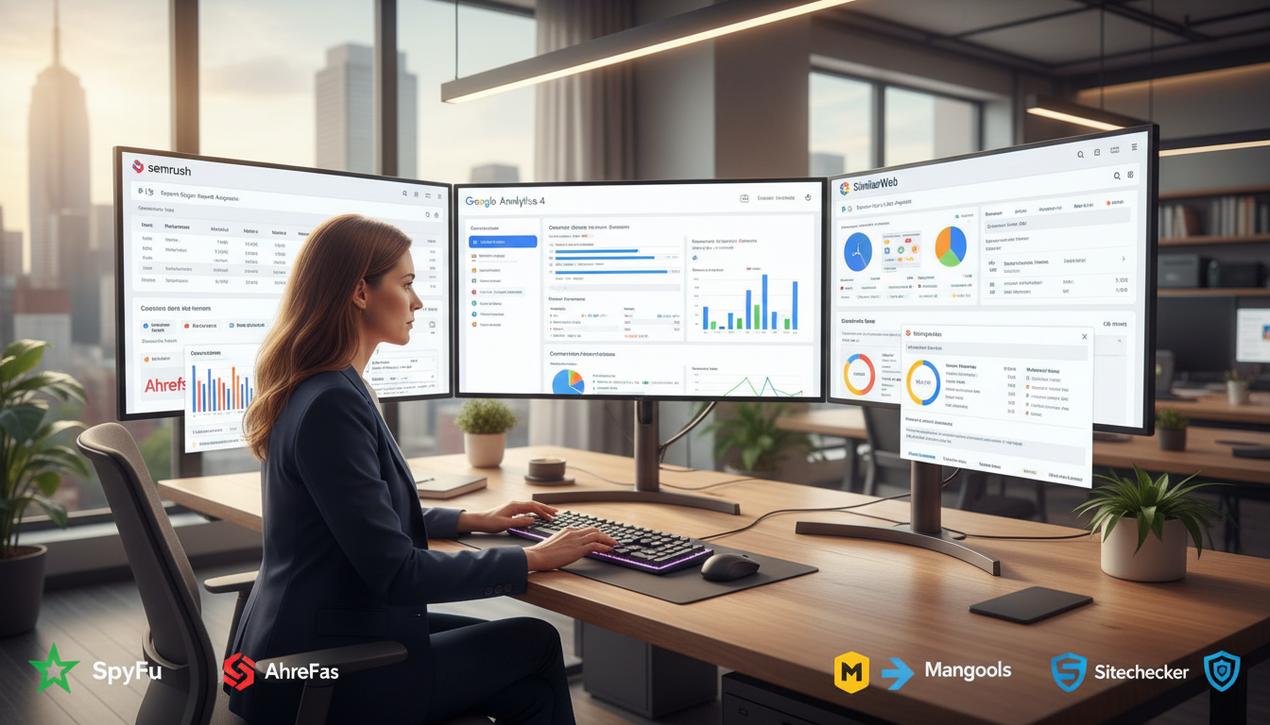Web Archives: The 2025 Guide to Viewing Old Websites


The internet is a universe in perpetual motion. Every second, millions of pages are created, updated, or deleted, shaping an ephemeral digital landscape. The statistics on “link rot” are startling; a recent Pew Research study found that 38% of all webpages that existed in 2013 had vanished a decade later. This digital decay means that valuable information, inspirational designs, and entire segments of our culture can disappear forever. This is where web archives come in, acting as digital libraries that strive to preserve this collective memory. Thanks to monumental initiatives that have already saved over 860 billion webpages, it’s possible to travel back in time and see a site as it existed months, years, or even decades ago. Far from being a mere novelty for the nostalgic, these tools have become indispensable for marketing professionals, legal experts, researchers, and creators. This comprehensive guide presents the 8 best online archive services for 2025 and explains how to leverage them strategically.
Why View Old Versions of a Website?
Beyond simple curiosity, accessing web archives serves very real professional and practical needs. These “time machines” offer strategic insights across many fields, turning the digital past into a competitive advantage for the present.
A Strategic Tool for Marketing and SEO
For web professionals, archives are a goldmine. They allow for an in-depth analysis of competitors’ evolution: How has their homepage changed over time? What promotional offers did they feature a year ago? Which selling points have they abandoned? It’s a powerful way to understand their long-term strategy. For SEO, it’s also a potent lever for “broken link building” strategies. By identifying valuable pages that no longer exist on authoritative sites, you can pitch your own content as a replacement to acquire high-quality backlinks and boost your domain authority.
A Necessity for Legal and Compliance Purposes
In the corporate world, digital evidence is paramount. Web archives can serve as irrefutable proof of a page’s content on a specific date. This can be crucial in cases of intellectual property disputes, defamation, or false advertising. Furthermore, industries like finance and healthcare are subject to strict regulations requiring comprehensive archiving of all online communications. Specialized services ensure this compliance and guarantee data integrity for potential audits.
An Invaluable Resource for Research and Information Access
For historians, sociologists, and journalists, web archives are the libraries of the 21st century. They make it possible to study the evolution of society, political discourse, or cultural trends. They also provide vital access to information that has been deleted, whether due to a site shutting down or because of censorship. In some contexts, viewing an archived version of a news site is the only way to access a critical article that has been taken offline.
The 8 Best Web Archiving Tools for 2025
The online archive market is diverse, ranging from massive non-profit projects to highly specialized enterprise solutions. Here is our selection of the most effective and relevant platforms for 2025.
1. Internet Archive (Wayback Machine): The Undisputed Giant
The Internet Archive is the most famous and extensive player in this field. Run by a non-profit organization, its mission is to create a universal digital library. Its “Wayback Machine” provides a simple interface where you can enter a URL to see a calendar of all available snapshots. With over 860 billion pages archived, it’s the starting point for any historical search. Its main strength is its historical depth for popular websites. However, it can be less comprehensive for niche or very recent sites.
2. Archive.today: On-Demand Archiving
Unlike the Wayback Machine, which crawls the web automatically, Archive.today (with its alternative URLs like archive.ph) operates on demand. When a user submits a URL, the service creates an instant copy of that page. This makes it the ideal tool for saving an important page that has just been published and isn’t yet in the major archives. It captures both the text and a graphical copy, creating a permanent, unalterable link that is very useful for sharing and citation.
3. PageFreezer: The Professional Solution for Compliance
PageFreezer is a SaaS solution designed for businesses. Its goal is not to preserve web history but to provide legally admissible archives for legal and compliance needs. It captures not only websites but also blogs, social media, and team collaboration platforms in real-time. It guarantees the authenticity and integrity of its archives, which can be used as legal evidence. It’s a robust solution for regulated industries.
4. oldweb.today: The Immersive Nostalgia Trip
This tool offers a unique approach: it doesn’t just display an old page, it emulates old browsers like Netscape Navigator or early versions of Internet Explorer to render it. oldweb.today draws from multiple archive sources to provide a complete and authentic browsing experience from the past. The process can be a bit slow, as it needs to launch an emulator, but the result is fascinating for understanding not just the design but also the user experience of a bygone era.
5. Memento Time Travel: The Smart Aggregator
Rather than an archive itself, Memento Time Travel is a protocol and browser extension that acts as a meta-search engine. When you visit a page and request an archived version, Memento queries dozens of public web archives simultaneously. It then presents the most relevant version based on your chosen date. This is a huge time-saver that maximizes your chances of finding a copy of a hard-to-find page.
6. Perma.cc: The Archive for Lasting Citations
Developed by the Harvard Law School Library, Perma.cc was created to solve the “link rot” problem in academic and legal publications. When researchers or judges cite an online source, Perma.cc allows them to create a permanent link to an archived version of the page. This link is guaranteed never to break, ensuring the long-term reliability of sources. Its use is primarily intended for the academic world, but it highlights the critical importance of archiving for the integrity of knowledge.
7. National Archives (Library of Congress, UK Web Archive)
Many national libraries, such as the U.S. Library of Congress or the UK Web Archive, have their own archiving programs. Their approach is often more qualitative than quantitative. Instead of saving everything, they curate and organize collections of websites by theme or event (e.g., sites related to a presidential election). Their direct URL search is less effective, but browsing their collections is a goldmine for thematic research.
8. Arweave: The Promise of a Permanent, Decentralized Web
Arweave represents the future of archiving. It is a decentralized storage solution built on blockchain technology. The concept of the “permaweb” is simple: when you upload data, you pay a small, one-time fee that guarantees its storage permanently—potentially for centuries. It’s a radical new approach aimed at creating an internet that is resistant to censorship and data deletion, where information is stored in a distributed manner across thousands of computers.
The Limits and Challenges of Web Archiving
Despite the power of these tools, web archiving is not an exact science and faces considerable technical and ethical hurdles. Understanding these limitations is essential for using archives critically and effectively.
The Challenge of Dynamic Content and Social Media
The era of the static web is over. Today, websites are predominantly dynamic, built with technologies like JavaScript that load content based on user interactions. Traditional archiving crawlers often see only a blank or partial page. Likewise, archiving an infinite Twitter feed or a Facebook conversation is immensely complex. Modern solutions use headless browsers that simulate a real user to capture this content, but the process is resource-intensive and never perfect.
The “Right to Be Forgotten” and Technical Barriers
The web is not a lawless space. A website’s robots.txt file can explicitly forbid archiving bots from saving its content. Furthermore, site owners can contact archives to request the removal of their history, in accordance with data protection regulations like GDPR. This creates “gaps” in web history that are not due to technical failures but to deliberate choices.
By exploring the web’s past, we do more than just satisfy our curiosity. We equip ourselves with powerful tools for competitive analysis, legal protection, and the preservation of our digital heritage. Web archives, from the monumental Wayback Machine to the decentralized solutions of tomorrow, are the guardians of a fragile collective memory. Knowing how to use them means knowing how to turn the ephemeral into lasting knowledge—an essential skill in the digital world of 2025 and beyond.




